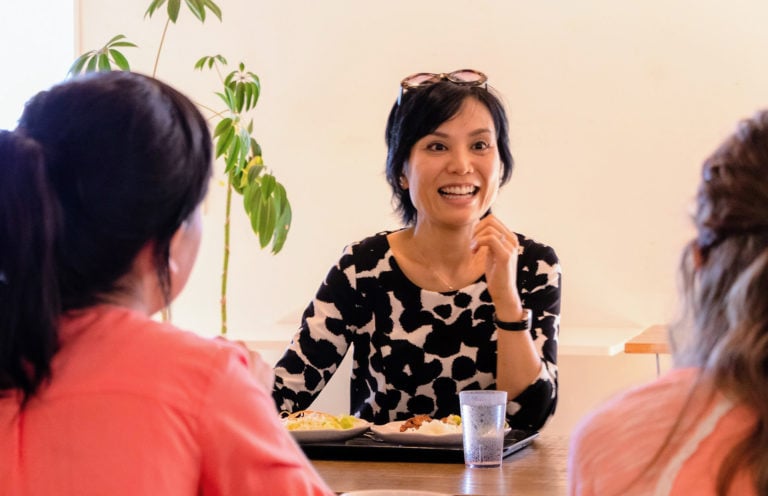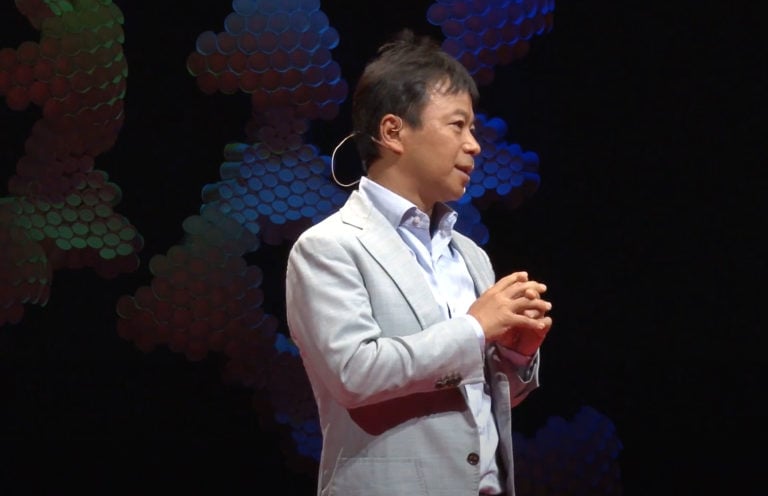A letter from Head of School Malcolm McKenzie to the UWC ISAK Japan Community on a culture of forgiveness.
December, 2022.
I am pleased to be writing to you as this year ends, because it has been a momentous year, for the world and for our school. In our world, it is difficult to avoid numbing negatives like wars, extreme climate events, killings, the ongoing pandemic and other health scares, and much more. News media can be fountains for depression, if we drink from them too obsessively.
But the news from UWC ISAK Japan is positive. The transition from our Founding Head, Rod Jemison, to me as the interim Head of School until June 2024, has been smooth. Rod is still living on campus and he and I see each other regularly. He is a valuable resource and guide to me, providing much needed continuity as I settle in. I am finding it relatively easy to settle in to a school that has been built on such strong foundations.
Being back in a UWC is an exhilarating experience, and it is a great privilege to be here. I was the Principal of UWC Atlantic College in Wales from 2000 to 2007, and both my children are UWC graduates. So, this feels familiar, a little like a homecoming. But it is also surprising, surprising to be here in the first place, and then full of everyday surprises. I love the surprises that students create all the time – they are so talented and energetic. And the same is true for the adults who work here.
There is no doubt that UWCs are exciting places, but they are also challenging – enjoyable and exacting at the same time. Our students are stimulated and stretched every day by the totality of our curriculum. On top of this, it is not easy to be away from home, culture and, in many cases country – living and learning in such a diverse residential community. Diversity and difference are superb teachers, on all levels, and we learn a great deal from them, to be sure; but they can also be testing and trenchant daily companions. To succeed in this type of environment, and be happy, we need to be flexible and agile, generous to ourselves and gracious to others: in two words, giving and forgiving.
I want to reflect a little on those two words in the remainder of this letter, in the hope that this will give you an uplifting seasonal message. I’ll do so by sharing some thoughts about a great South African compatriot of mine, Archbishop Desmond Tutu. I was fortunate to meet Desmond a few times and I have written about him before. He was certainly one of the most celebrated, and compassionate, of contemporary South Africans. After Nelson Mandela, Desmond may be the best known of my compatriots. He was a truly remarkable person. Tutu won the Nobel Peace Prize in 1984, almost 10 years before the same award was given to Mandela. Soon after this, in 1986, he became the Archbishop of Cape Town, from where he gained his nickname, “The Arch”. The Nobel Peace Prize Motivation (or citation) for Tutu praised him “for his role as a unifying leader figure in the non-violent campaign to resolve the problem of apartheid in South Africa”. In his insistence on non-violence, Tutu was an intentional heir to Mahatma Gandhi and his practice of satyagraha. Gandhi had developed this philosophy of non-violent protest when he lived in South Africa in the last few years of the 19th century and the first few of the 20th, before returning to India.
Desmond Tutu passed away on December 26, 2021, almost one year ago. Like many South Africans, I am still mourning this huge loss. Tutu was a gracious, generous, spirited, just, giving and forgiving human being and change-maker the likes of whom we do not see nearly frequently enough. If there were more such people, our world would be a much better place. As a model for compassion and peace-building, he is someone who is an exemplar to our UWC movement.
In one of his many roles as a nation builder, Desmond Tutu was the Chairman of the South African Truth and Reconciliation Commission (TRC). This bold and largely successful experiment in restorative justice was set up soon after the open elections in 1994 had brought apartheid and legalized racial discrimination to an end. The Commission toured the country over a period of years, holding hearings in cities and towns large and small. Victims of racially motivated and state sanctioned violence were encouraged to come and tell their stories, in public. Sometimes the perpetrators of the violence made public confessions. The purpose of the TRC was to encourage openness, recognition, forgiveness, and healing – healing that was individual, communal, and national. It was a hard, grueling, but also exalting experience. The TRC was given the power to grant amnesty, which it did, at times controversially. Almost all the victims of this violence were black, such was the nature of the evil racist system, but not every single one. Amy Biehl was a Stanford University activist student who came to Cape Town on a Fulbright Scholarship in 1992. Amy wanted to help in the final days of the dying of apartheid. Here is Desmond writing about Amy Biehl:
On August 25, 1993, she was driving into the Gugulethu township when her car was stopped by an angry mob. The group had just emerged from a political meeting to protest the police slaying of a young black boy. Amy’s passion for justice and her purpose for being in South Africa were not written on her face. To the protesters, Amy was just another person, another symbol of apartheid oppression. They dragged her from the vehicle and beat, stoned, and stabbed her to death. Amy was twenty-six years old.
In 1998, the four young men convicted of her murder were granted amnesty by the TRC. Amy’s parents, Linda and Peter Biehl, not only supported this decision but went on to establish the Amy Biehl Foundation Trust in Cape Town. It is a charity dedicated to fighting violence and helping the very community where Amy was murdered. Two of the men, Easy Nofemela and Ntobeko Peni, now work for the foundation named after the woman they killed. They have a close relationship with Linda Biehl (Peter Biehl has since passed away) and have formed a unique bond.
How could such forgiveness come to pass? Imagine not only agreeing to the pardon of your daughter’s killers but employing them and developing a close working relationship with two of them. This seems superhuman. In 2000, when I spent some time at Deerfield Academy in Massachusetts as the Academy’s first Bicentennial Visiting Scholar, I designed and taught Grade 12 courses in South African and African Literature. I invited Amy’s parents, Linda and Peter Biehl, to come to the Deerfield campus, from California, to tell their story. They were compelling, and electric in their compassion. They changed the lives forever, through their witness, of the young American students who were privileged to hear their tale of forgiveness.
Desmond Tutu wrote a great deal, about his faith, the TRC, and the complexities of our humanity, of being human. In 2014, he and his daughter Mpho published The Book of Forgiving, subtitled “The Fourfold Path for healing ourselves and our world”. In the final pages of the book, they wrote this:
We can’t create a world without pain or loss or conflict or hurt feelings, but we can create a world of forgiveness. We can create a world of forgiveness that allows us to heal from those losses and pain and repair our relationships. The Book of Forgiving shares the path to finding forgiveness, but ultimately no one can tell you to forgive. We can ask you to do so. We can invite you on the journey. We can show you what has worked for others. We can tell you that the healing that we have seen from those who have walked the Fourfold Path is humbling and transformative.
Here is that Fourfold Path:
Telling the Story;
Naming the Hurt;
Granting Forgiveness;
Renewing or Releasing the Relationship.
It is not possible to do justice in a few sentences to the intricacies of this pathway, or journey. If you wish to grasp it fully, read the book. But here are a few indicators. Telling the story is the way of making meaning of our hurt and injury, and the first step in reclaiming our dignity. Not telling our story binds us to our trauma. Naming the hurt deepens the detail, allows feelings to be attached to the facts, and begins the movement forward from pain and grief. Granting forgiveness may be slow and drawn out, but through recognizing a common humanity, and choosing to forgive, we can gain freedom from the damage of the past. Renewing or releasing the relationship is the final and fourth stage. Forgiveness sometimes leads to renewal of a relationship, sometimes full release from it.
In the weeks after his death late last year, news media and social media were full of quotes and sayings attributed to Desmond Tutu. Many of these captured his irreverent wit, his refusal to accept injustice, and his generosity of spirit. Here are just two, which resonate with me and with the themes of giving and of practicing forgiveness: If you want peace, you don’t talk to your friends. You talk to your enemies….and, Enemies are always friends waiting to be made.
Forgiveness was at the core of Desmond Tutu’s faith, and life. This season of Christmas and the Gregorian calendar end-of-year always communicates varied messages, whatever festivals we might or might not observe. One message recognized in many places is that we focus on giving at this time – the giving of gifts. These gifts can be material presents, and they can also be intangible gifts like the renewal of friendships, or the love of family. Giving is so important, and it is good to have a few times in the year when we have a special focus on this. Giving, and receiving, bring joy.
If giving is joyful, forgiving offers even deeper delight, the delight of freedom and fulfilment. We perfect our lives, we make them whole, by what and whom we are called on to forgive, and by how generously and how graciously we respond to this calling. Others can do the same for us in return – forgive us when we have wronged them, and by so doing make matters whole again. Christmas may be for giving, but forgiving is forever.
And so back to UWC ISAK Japan, and some of my comments at the start about the challenges of living and studying in a UWC. If we can find it in ourselves, and in others, to be both giving and forgiving, our lives together in communities like this are positive, pleasant, and powerful. We build bridges of support for ourselves and for each other, bridges that in time will extend outwards to many others who have never experienced a United World College but might be helped in various ways by those who have. All this we can and must do, in the spirit of Desmond “The Arch” Tutu, constructing our own archways that support and bolster possibilities for peace and harmony, within this community and in communities across the world.
Have a wonderful break: enjoy this time away from school routines, relax, recharge, and stay safe.
Warm regards,
Malcolm




